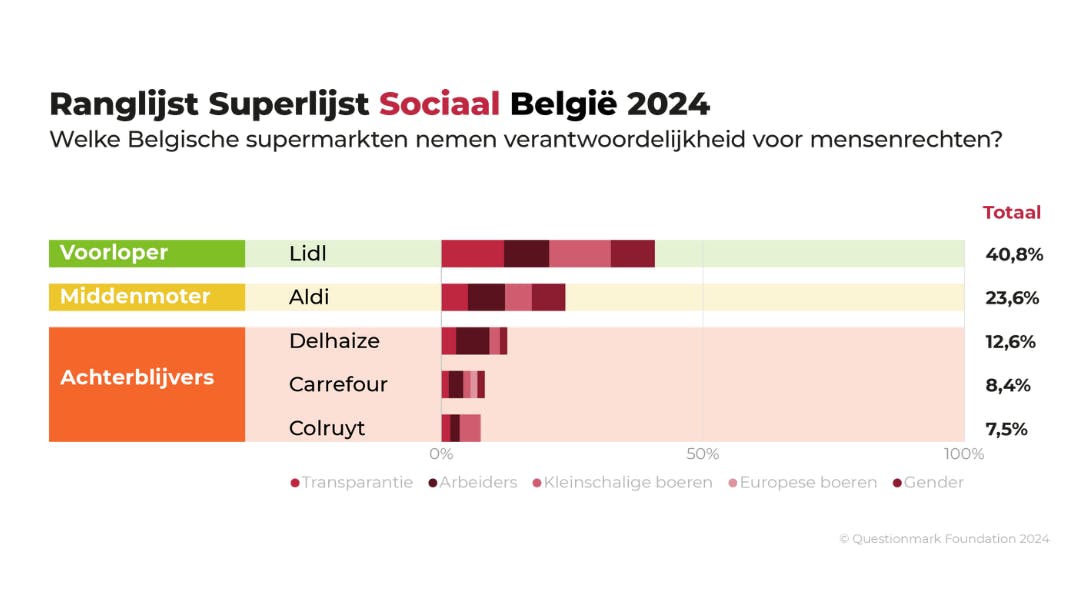
Lidl clearly leads the way, but no major Belgian supermarket is doing enough to protect human rights in their supply chains. This is concluded in Superlist Social, a research that compares how Aldi, Carrefour, Colruyt, Delhaize and Lidl protect human rights, gender equality and the rights of agricultural workers, small farmers in the Global South and European farmers. There are strong projects, for example for cocoa farmers, but a comprehensive approach for all chains is lacking. The European Corporate Sustainability Due Diligene Directive will demand this from sueprmarkets. This Superlist is an initiative by think tank Questionmark, in collaboration with Rikolto and support from Oxfam Belgium and Fairtrade Belgium.
Lidl in the lead, but no guarantee of human rights
In the ranking, Lidl is the frontrunner and Aldi is in the midrange. Delhaize, Colruyt and Carrefour perform least well. Lidl annually analyses which chains have a high risk of human rights violations, then identifies and responds to the problems. Lidl is also the most transparent about its suppliers and is the only supermarket to have a complaints procedure specifically for its supply chains. Lidl and Aldi are also the only ones to have an action plan against gender-based violence for all their chains.
Nevertheless, no supermarket can guarantee human rights compliance in its supply chains. "However, as of 2027, supermarkets have to identify, tackle and prevent human rights violations," says Jelle Goossens of Rikolto. "That was decided this year in the European Due Diligence Directive. So this research is a solid wake-up call for supermarkets."
Charlotte Linnebank, Director Questionmark, concludes, "It is striking that Lidl is strongly ahead in Belgium, but there is a lot of room for all supermarkets to take more responsibility. I hope that all supermarkets find support through our recommendations and show more transparency, policy and action for human rights in the next survey."
Sporadic steps for higher incomes for farmers and workers
Most supermarkets are working in some chains to improve incomes for small-scale farmers and agricultural workers. Lidl, Aldi, Colruyt and Delhaize are committing to a living wage for workers on banana plantations. Colruyt is the first supermarket to report on the gap between a living income and the current wage of cocoa farmers in the Ivory Coast. "These are valuable projects with real impact," states Philippe Weiler, CEO of Fairtrade Belgium. "But supermarkets sell countless other products, such as coffee, where the social and environmental challenges also require such an approach."
Little commitment to European farmers
The research also looks at policies for European farmers. This spring, farmers in Belgium and Europe took to the streets en masse out of dissatisfaction. Carrefour is entering into long-term contracts and Colruyt is buying from cooperatives, which is good for farmers' bargaining power. But no supermarket has formulated an organisation-wide commitment to long-term contracts and fair prices for European farmers. "Supermarkets and European farmers can build fair and stable relationships together. The good examples that we already see here should become the standard," says Jelle Goossens of Rikolto.
Identify, tackle, prevent
Superlist Social calls supermarkets to action. Bart Van Besien, Oxfam Belgium: "A first important step is to map your risks and assess this negative impact. After that, you can effectively prevent and resolve human rights violations." Superlijst Sociaal shows that currently not a single supermarket has included and applies all the steps of duty of care in its policy. "So supermarkets still have a lot of work to do," Van Besien concludes. "This should be a wake-up call with the prospect of upcoming legal obligations."